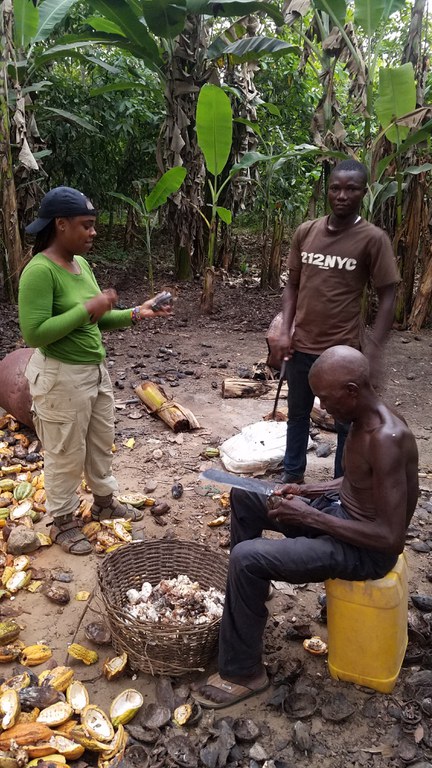Posted: August 8, 2017
As a dual-title doctoral candidate in Entomology and International Agriculture & Development, I dreamed of living in a developing country to offer my expertise and transform the deprived lived of marginalized small farmers. Funding from Penn State University and the USDA Norman Borlaug Fellowship afforded me the opportunity to spend a year in Ghana alongside cocoa farmers to document arthropod communities, conduct sociological investigations and test the effectiveness of pesticide replacements.
Ghana is the world's second largest producer of cocoa beans. However, farmers are not able to maximize yield potential due to pests and plant diseases that destroy as much as 70% of production annually. Arrival of devastating insect related diseases like black pod (a water mold disease) and swollen shoot means yield losses can approach 100%. Both diseases are influenced by ants which either transport or protect insects that infect virus or traffic infectious soils onto otherwise healthy cocoa pods.
These pest and disease problems can be resolved by identifying and removing disease-maintaining insects from the system using low input technologies as well as educating farmers on beneficial and detrimental insects of cocoa. My research aimed at improving yields by using handmade, high pressured soapy water solutions as an alternative to pesticide application. Liquid soap proved to be a natural insecticidal agent that damaged the protective outer coating of the insects that feed and maintained diseases on cocoa.
Over the past year, I monitored and sampled the insect diversity of 20 low yielding cocoa farms and optimized a pesticide-free management strategy which increased yields and enhanced beneficial insect populations, by reducing pests and disease to boost the overall health of the cocoa landscape. Scientific field experiments were coupled with qualitative research in the form of field interviews and focus groups which revealed how farmers received agricultural knowledge and predicted constraints that hinder future pest management adoption. As a result of these interventions, hundreds of farmers have had the opportunity to learn new pest management strategies for cacao.
Overall, spending a year in a developing country has allowed me to bridge the gap between agricultural experts and farmers battling hardships of climate change and disease management to minimize financial insufficiency accompanied with crop decline. Bridging this gap is especially important since over a billion individuals are employed in the agriculture sector and increased government expenditure on agricultural research and programs has a positive correlation to poverty reduction and food security.
INTAD
Address
Melanie Miller Foster106 Agricultural Administration Building
University Park, PA 16802
- Email mjm727@psu.edu
- Office 814-863-0249
- Fax 814-865-3055
INTAD
Address
Melanie Miller Foster106 Agricultural Administration Building
University Park, PA 16802
- Email mjm727@psu.edu
- Office 814-863-0249
- Fax 814-865-3055


